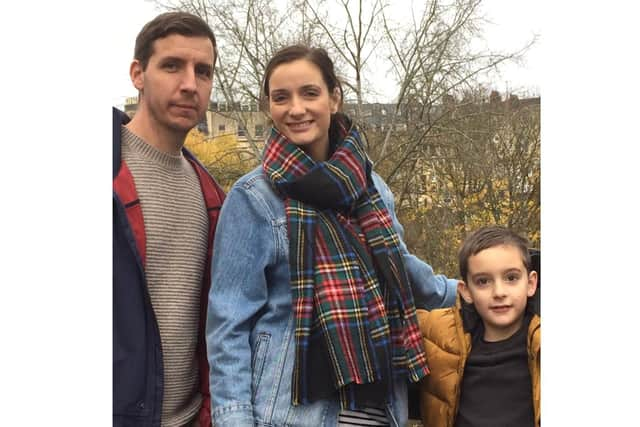Portsmouth mum fears son could have same gene that caused her heart to fail – but thanks QA staff for saving her life


Seven years ago Kirsty Wild and her husband Chris were celebrating the birth of their first son Harry before she got life-altering news.
The then 31-year-old from Portsmouth was ready to get back to work after a year of maternity leave but after feeling tight chested and short of breath she took a trip to her GP.
Advertisement
Hide AdAdvertisement
Hide AdKirsty said: ‘I went to see my doctor as I couldn’t even lie flat. I was told it was just a bug and started taking an inhaler.’


Two weeks on, Kirsty was still feeling poorly and after an electrocardiography (ECG) came back with abnormal results she was sent straight to Queen Alexandra Hospital in Cosham immediately for an x-ray.
She said: ‘I was so shocked to hear what the doctor told me. My x-ray showed my heart was enlarged with fluid on my lungs. This is when everything changed for me.
‘The hardest part of it all was being diagnosed with dilated cardiomyopathy, something I am stuck with for the rest of my life.’
Advertisement
Hide AdAdvertisement
Hide AdThe condition decreases the heart’s ability to pump blood because the heart’s main pumping chamber, the left ventricle, is enlarged and weakened.
As a precaution, the heart failure team decided to fit an implantable cardioverter-defibrillator (ICD) to Kirsty’s heart, which is a device that sends shocks to the heart whenever it detects the heart going into dangerous life-threatening rhythm.
Following her stay in hospital, Kirsty’s life had drastically changed and had to completely rely on her husband, Chris for everything.
She said: ‘I was very sick, I couldn’t climb the stairs or even pick up my baby. My husband had to do everything around the house from cooking, cleaning and bathing me.
Advertisement
Hide AdAdvertisement
Hide Ad‘I had to take 18 months off work where I learnt to do everything again. I have learnt to listen to my body and know my limits.’
Kirsty continued to live normally with her ICD until September last year.
The insurance worker said: ‘It started off as a normal day. I watched a bit of TV and then went to put some washing out on the line when suddenly I started to feel really dizzy and lightheaded
‘I quickly sat on my kitchen floor and, the next thing I know, I have fainted.I woke up laid on the floor confused. I managed to drag myself to call an ambulance and my husband, who took me straight to QA.’
Advertisement
Hide AdAdvertisement
Hide AdKirsty spent the next two days back in hospital where she was informed that her ICD had actually saved her life.
Marking Heart Failure Awareness Week, she told The News: ‘I couldn’t believe it. I am so glad the heart failure team fitted the ICD as it saved my life and I can’t praise them enough.’
Following her near death experience, the 38-year-old now fears for her son’s life after genetic testing came back indicating that she has a rare altered gene called ‘bag3’.
Lead Heart Failure Nurse Specialist Dawn Lamber said: ‘Genetic testing is quite complex with around 50 gene mutations discovered so far. Those we know about can also mutate and variants can look different in individuals.
Advertisement
Hide AdAdvertisement
Hide Ad‘Nationally they are trying to collect a library of gene mutations and this may aid diagnosis of dilated cardiomyopathy, progression of illness, whether an individual is likely to have arrhythmias.’
Kirsty will not know the future of her son until he is at least 10-years-old when he too can have the new gene testing.
She added: ‘It is a nerve-wracking thought as my three brothers could potentially have this altered gene as well as my eight-year-old son.
‘The thought of my son going through what I have is not a thought any mother wants to have.’